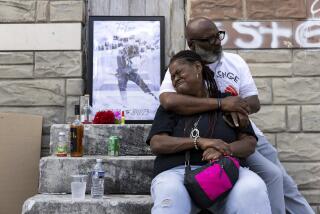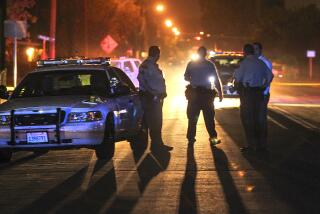A bereaved grandmother answers one of L.A.’s deadliest questions: ‘Where you from?’

- Share via
Across the street from an elementary school and next to a South Los Angeles church stands a towering yellow billboard emblazoned in large black letters with the last words Mark Leroy Tyree Jr. heard before he was shot and killed:
Where you from?
For decades in neighborhoods where gangs roam, the question posed to young men has often been the equivalent of a deadly greeting. How you respond doesn’t seem to matter much. Teachers know that. Cops know that. Even Tyree Jr.’s 72-year-old grandmother, Wilma Galathe, knows that.
But what Galathe didn’t know was just how many people around her had lost someone to a gang-related shooting and, in some cases, in the same manner as her grandson.
Enraged, Galathe decided to do something about it — launching a nonprofit organization to spearhead an anti-gang billboard campaign in Los Angeles.
“The killings have got to stop,” she said.
The #IAintFromNowhere campaign began last month with the help of Clear Channel Outdoor, an international advertising company, which designed and provided the billboards free of charge.
“What she wants to do is really drive attention to the problem,” said Layne Lawson, Clear Channel’s vice president of public affairs. “It’s not something that’s in front of everybody’s mind, there’s still gang issues and there are problems.
“It’s not just a South L.A. issue…. It’s a national issue. I see this turning into a national campaign,” he added.
Billboards raising awareness about violence may seem contrary to recent crime trends. In Los Angeles, violent crime, which includes homicide, rape, robbery and aggravated assault, is down. Homicides are at their lowest number in 50 years.
But the death of a teenage boy over a question is a constant reminder that gang violence isn’t going away.
Between May and November 2018, nine of the 10 neighborhoods with the highest crime rates were in South Los Angeles, according to The Times’ Mapping L.A.
Galathe wants the billboards to take what seems like a problem for one neighborhood to be part of a larger movement to address gang violence across the country. She wants people far removed from the problem to do something about it and for nonprofit organizations combating gang violence to work together.
The idea for the billboards came to Galathe after she lost her grandson in June 2016.
Authorities said Tyree Jr. was standing with two friends in the frontyard when a gray Chevy Camaro pulled up next to them. Los Angeles County Sheriff’s Det. Dominick Recchia said witnesses heard the front passenger ask Tyree Jr. where he was from. The 15-year-old gave a common and neutral response: nowhere.
“They didn’t like the answer, so they shot him,” Recchia said. “If people don’t know, there’s really no right or wrong answer to that kind of question. If someone answers and if you’re from the wrong gang it’s going to lead to violence, but if you’re asked that question and say you’re from nowhere, they may not like that answer, either.”
Three months later, Tyree Jr.’s father was fatally shot during an argument outside a restaurant, nine blocks from where the teen had been shot.
Recchia said the father and son shootings were not connected.
Alex Alonso, a professor of Chicano and Latino studies at Cal State Long Beach and a gang expert, said the outcome of the question “where you from?” in urban subculture can vary depending on who is doing the asking. He said law enforcement exaggeration of the phrase has contributed to a misunderstanding of a complex question.
In a city divided into many neighborhoods, people ask it to determine someone’s background.
“It’s the ghetto way of introducing yourself,” Alonso said. “Kids say it all the time and start using it in elementary school and high school.”
When gang members ask it, they’re trying to determine what gang the person belongs to. Sometimes, if it’s a rival gang member, it can lead to violence. Other times it doesn’t.
Alonso questioned the use of it for the campaign but acknowledged there is little understanding of gang culture and that the question can lead to violence, despite the response.
“It does happen. It is real,” he said.
For months, Galathe went about her days, grieving. Even in the worst of times, she looked to God for strength and hope. But this time, it was different. She felt lost.
When deputies visited to check up on her, one of them told her she would turn her tragedy into her triumph.
“I couldn’t understand, how?” she said. “My grandchild was killed, how am I going to triumph? I kept saying it over in my head.”
Galathe spoke often about her grandson and his death. She soon found herself becoming more aware that everyone she was coming into contact with in her neighborhood — bank tellers, strangers on buses and in stores, neighbors and church members — had suffered similar losses.
How was it possible to not be aware when it was happening outside her home?
“I don’t know, maybe I got used to my surroundings,” she said. “You hear about shootings, car accidents, robbery, and you relate to it to some degree, but you remove yourself when you go about living your own life.”
All that changed after Tyree Jr. was killed, after she began talking about it with anyone who would listen, only to learn that they too had suffered a loss.
One day, riding a bus, she struggled with her dilemma. Something needed to be done. People in L.A. had to know how widespread the problem had become.
That’s when she looked up and saw hope: a billboard by Clear Channel.
She called and inquired about advertising on it.
The company has worked with law enforcement and nonprofit groups on public service campaigns. Over the years, the company has used its billboards to distribute information related to the Boston Marathon bombing, Christopher Dorner and the Grim Sleeper.
“It was a terrible situation about what happened to her grandson, and she was trying to make something positive that was negative,” Lawson said. “It was great to be able to help her out.
“She was the heart and soul of the campaign.”
In addition to the billboards, Galathe launched a nonprofit organization of her own: the Mark L. Tyree II Movement for Positive Change and Unity.
Twitter: @latvives
More to Read
Sign up for Essential California
The most important California stories and recommendations in your inbox every morning.
You may occasionally receive promotional content from the Los Angeles Times.











